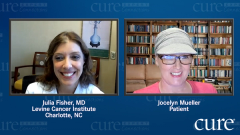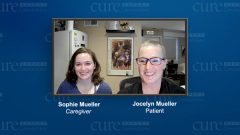
HER2-positive Breast Cancer and COVID-19
Patient Jocelyn Mueller and oncologist Julia Fisher, M.D., describe some of the adjustments that had to be made to Jocelyn’s treatment for HER2-positive breast cancer due to the COVID-19 pandemic.
Episodes in this series

Julia Fisher, MD: I would like to pivot a little bit and talk in our remaining minutes about everyone’s favorite topic: COVID-19. How has that affected your process? How has that affected the care that I offer my patients? You mentioned that the pandemic influenced your decision-making about working.
Jocelyn Mueller: Yes, very much so. I don’t know that I would’ve worked in any situation because in preschools, they’re precious little babies. However, they’re Petri dishes; that would’ve been a little risky. The other thing is, I’m alone during my infusion. Like I had mentioned before, I had gone with a friend a couple of times when she had her treatments, but I can’t have anybody with me because of COVID-19. When I come to see you, I get a COVID-19 test. It didn’t impact my choice of treatment in any way, and it didn’t change anything as far as the duration of my treatment. I don’t know if it will change my treatment down the road. I know I will have surgery in December, and then some reconstructive surgery. I don’t know what the timing on that will be, or if COVID-19 will affect that because of elective versus necessary surgery. That’s still to be determined, I think. One of the things I want to stress is, my breast cancer was found on an annual screening mammogram. I had no idea there was a problem. I would believe that a lot of people are pushing off appointments like that right now because of COVID-19. It’s very safe to go in and get these tests done. If I had waited and thought, “Oh, it’ll be fine,” my situation could be very different than it is. I have HER2-positive breast cancer. It’s aggressive, and I hope that women are going and getting their screening regardless of the pandemic.
Julia Fisher, MD: Absolutely. Thank you for emphasizing that. You’d have to be deaf, dumb, and blind to have been in this country in the last 20 years and not witness the push for routine screening mammograms and the notion that the earlier we catch a breast cancer, the more capable we are of eradicating it. Yes, we’re all concerned about what are going to be the long-term effects of potentially people delaying their screening studies. From the provider perspective, I think there’s good and bad about the way the pandemic has affected us. To me, the good news is I have not been unable to schedule people for their treatment. We haven’t had to alter the interval for treatment, and we haven’t had delays in getting people started in treatment. We’re very fortunate in that in this center. I am very aware that there are other cancer centers, cancer practices, and infusion centers elsewhere that can’t claim that. Thankfully, here, through a combination of diligent and vigilant planning and safety precautions, we’ve been able to treat people throughout. Periodically, there have been interruptions in surgeries, but thankfully again, we’ve not gotten to the point where an oncologic surgery would be delayed. No one’s lumpectomy or mastectomy has been delayed due to the pandemic, but reconstructive surgeries have been. While those are being delayed because they are “elective” or they’re for non–life-threatening issues, clearly that has a significant psychological impact, and we’re all very sympathetic.
Thankfully, as I said, medically, I haven’t really been impacted in terms of having to choose different regimens because, “I can’t use this one because of COVID-19.” Timing hasn’t been altered, which is great, and my monitoring has been pretty similar to before. At one point early on, we were doing more virtual visits and alternating those. For many of my patients on treatment, we were still doing those visits face-to-face when possible; that physical exam is very important. What the negative has been is as you said, I think it’s got to be really hard. I hate that people can’t bring a visitor or a family member with them to infusion. It is a long day to be in there on your own. The stress of having to get a COVID-19 test before treatment and having to come in here a whole extra day to get a COVID-19 test; I think people must feel like they already live here. I hate to have somebody incur yet another visit to this place. This pandemic has been a stressful, frightening time, in general, and having to add that to the significant stress of going through a cancer diagnosis and treatment program, I’m sure that’s challenging. We sure do our best to try to ease the way and make up for people’s lack of ability to have somebody in the infusion suite with them. I know we don’t substitute for a partner, a child, a parent, or a friend. The bottom line is, it’s probably been a lot psychologically harder to go through cancer treatment during this process. However, I’m very thankful that at least here the quality of care hasn’t been affected.
Jocelyn Mueller: No, it has not been affected at all.
Julia Fisher, MD: It will be very interesting down the road, as you alluded to; we’ve got a lot of concerns about people missing out on their routine primary care visits, their routine age-appropriate cancer screenings, and what the downstream effects of that will be. I think we all can agree that much ink will be shed over the years 2020 and 2021. Hopefully, not beyond that.
Jocelyn Mueller: Right.
Julia Fisher, MD: Thank you so very much for sharing your perspectives, and for embarking on this discussion this morning with me. To our viewing audience, we hope that you found this Cure Expert Connections® program to be rich and informative. Thank you for being here with me today.
Jocelyn Mueller: Thank you.
Transcript edited for clarity.

